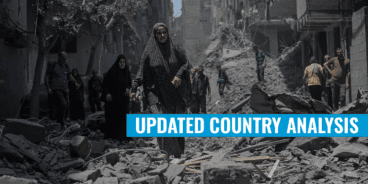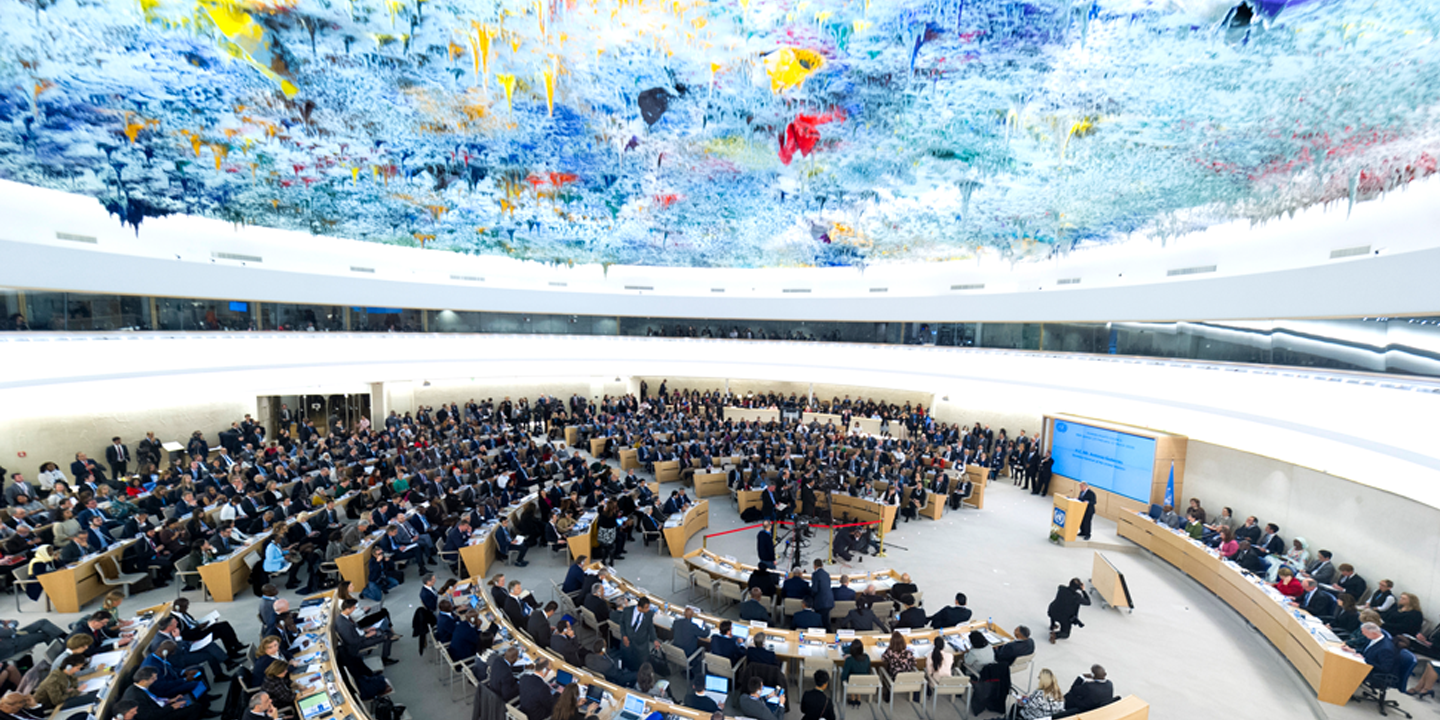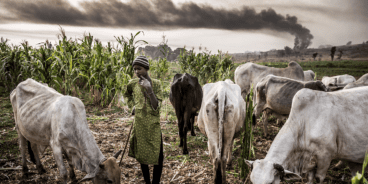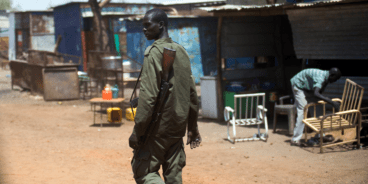

South Sudan: Adopt a strong resolution extending UN investigations for two years
To Permanent Representatives of Member and Observer States of the United Nations (UN) Human Rights Council
Excellencies,
Ahead of the UN Human Rights Council’s (hereafter “HRC” or “Council”) 58th regular session (24 February – 4 April 2025), we, the undersigned non-governmental organisations, write to urge your delegation to support the development and adoption of a strong resolution on the human rights situation in South Sudan.
The resolution should, among other elements, extend the mandate of the existing investigative mechanism, the UN Commission on Human Rights in South Sudan (CHRSS), in full, for two years, and request the CHRSS to regularly report to the Council, including on the presence of risk factors for atrocity crimes.
At its 55th session, in April 2024, the Council adopted resolution 55/1, which extended the mandate of the CHRSS with an increased margin of votes (21 in favour, 8 against) compared to April 2023 (when resolution 52/1 was adopted by a 19-9 vote). This outcome was in line with the expectations civil society outlined in a joint letter. In it, civil society emphasised that the CHRSS is “the only mechanism tasked with collecting and preserving evidence of violations of [international law]” with a view to ensuring accountability and “addressing human rights issues in South Sudan from a holistic perspective.” The signatories emphasised that “the conditions that prompted the HRC to establish the [CHRSS], in 2016, [had] not […] changed” and that grave violations, violence and impunity remained pervasive in the country.
The letter was released as uncertainty surrounded preparations for South Sudan’s first-ever national elections, which were due to take place in December 2024. Critical questions were unanswered, including on the type of election, political parties and voter registration issues, delineation of constituencies, and management of electoral disputes. Foundational tasks necessary for citizens to head to the polls were incomplete. The absence of a critical mass of pre-requisites, as well as severe restrictions on the civic and democratic space, led civil society to highlight risk factors of violence and violations associated with South Sudan’s inability to hold free, fair, secure, and credible elections.
One year on, and almost 14 years after South Sudan’s independence, in 2011, elections have not taken place. In September 2024, the Revitalized Transitional Government of National Unity (RTGoNU) announced that South Sudan’s Transitional Constitution would be amended to extend the transitional governance arrangements (and therefore the transitional period) outlined in the 2018 Revitalised Agreement on the Resolution of the Conflict in the Republic of South Sudan (R-ARCSS) by two years. As a result, national elections were postponed. They are now set to take place in December 2026, and the transitional period is now due to end in February 2027. In a statement, the Minister of Cabinet Affairs said the extension was “in response to recommendations by both electoral institutions and the security sector.” Analysts, however, pointed to the RTGoNU’s inability and unwillingness to create the necessary conditions for elections. The UN called the postponement “inevitable but regrettable” and urged South Sudan’s leaders to urgently take decisive steps to achieve benchmarks set out in the R-ARCSS.
This is the second consecutive extension of the transitional period. In August 2022, the transitional period and associated governance arrangements were already extended by two years and elections postponed from December 2022 to December 2024. The new postponement reflects South Sudanese leaders’ failure to implement the R-ARCSS and to deliver on their commitment to usher in a new era for the country. A statement by South Sudanese civil society captured citizens’ frustrations: “Our people are being asked to make an impossible choice: to either rush ahead with a series of transitional processes that have not been adequately prepared […] and have the potential to exacerbate conflict, or to accept yet another extension of a transitional arrangement that keeps leaders in power who have failed to deliver sustainable peace to the country.”
South Sudan is facing multiple crises. At the political and institutional level, despite a new extension of the transitional period, uncertainty remains high over the constitution-making and electoral process. A population census is long overdue; however, according to the National Bureau of Statistics, the process will likely take 16 months once it has started. Constituencies have not been delineated and voters are not registered. No mechanism is in place to resolve disputes over election results. Institutions that are due to manage or be involved in the electoral process, such as the National Elections Commission and the Political Parties Council, remain non-operational or ill-funded. Regarding the making of a permanent constitution, the Chairperson of the National Constitution Review Commission (NCRC) said it may take 18 months to complete the process, on the condition that resources are made available on time.
At the security level, arrangements have not been finalised with regard to elections. Armed forces are not adequately trained, equipped, or unified as a result of delays in the implementation of transitional security arrangements under Chapter II of the R-ARCSS. This means that former warring factions are not fully demobilised or disarmed. Reports persist of grave acts of sexual and gender-based violence (SGBV) around cantonment sites and in conflict-affected areas, committed by members of various armed and security forces, including the army, the South Sudan People’s Defence Forces (SSPDF) (formerly the Sudan People’s Liberation Army (SPLA)). Localised conflicts and intercommunal violence, including between armed ethnic-based militia groups, remain pervasive in parts of Central, Eastern and Western Equatoria States, Greater Jonglei, Unity, Warrap, Upper Nile, Lakes State, Western Bahr el Ghazal, as well as in the administrative regions of Abyei and Pibor. Furthermore, fighting is ongoing between government forces, holdout groups that did not sign the R-ARCSS, and defecting factions, which has been accompanied by abuses against civilians, including killings, sexual violence and abductions.
On 21 November 2024, security forces attempted to arrest the former head of the National Security Service (NSS) at his home in Juba. Heavy gunfire erupted and continued for over an hour. In a safety alert, the UN urged all staff to shelter in place. This showed the precarious security situation prevailing across the country.
The humanitarian situation remains of grave concern. It is characterised by high levels of hunger and food insecurity. Nutrition projections estimate that over two million children under five are at risk of acute malnutrition (including 650,000 at risk of severe acute malnutrition in 2025), significant increases from 2024 projections. Over four million South Sudanese (almost one third of the population) have been displaced, including 1.9 million living as internally displaced persons within South Sudan. 2.3 million South Sudanese remain abroad as refugees or asylum-seekers. In 2025, an estimated 9.3 million (out of South Sudan’s estimated population of 13.4 million) are projected to require humanitarian assistance. In addition, recent floods have affected over one million people and displaced 271,000 in northern South Sudan, amid rising hunger and a cholera outbreak. South Sudan is among the five most climate-vulnerable countries in the world and is affected by drought, floods and other natural disasters that compound access to livelihoods and exacerbate competition over scarce resources.
The cross-border impact of the war in its northern neighbour, Sudan, has exacerbated tensions and drivers of conflict in South Sudan, which has received over 905,000 refugees and returnees since April 2023, with an additional 337,000 people projected to arrive in 2025.
While petroleum accounts for 90% of national income, damage to one of the two pipelines shipping oil from South Sudan, as a result of fighting in Sudan, has deprived the country of vital revenues. These challenges compound existing economic hardships, including inflation and rising costs of living, as the government has announced austerity measures and most civil servants have not been paid their salaries for part of 2023 and the whole of 2024.
South Sudan’s “maelstrom of interlinked crises” also includes a civic space crisis. In addition to all the issues highlighted in last year’s civil society letter, in 2024, the National Security Service (NSS), an agency directly under the authority and supervision of the President and that serves as a tool of repression of independent and opposition voices, saw its unchecked arbitrary powers confirmed. Reneging on earlier promises to abolish the agency’s authority to arrest and detain anyone with or without a warrant, made together with First Vice-President Dr. Riek Machar in 2023, South Sudanese President Salva Kiir Mayardit gave his tacit assent to legislative amendments that confirmed key sections of the NSS Act 2014. Adopted by South Sudan’s Transitional National Legislative Assembly on 3 July 2024, the NSS Act 2014 (Amendment) Bill 2019 retained the agency’s powers to arrest people with or without a warrant on the basis of broad, vaguely-defined national security offences.
President Kiir did not heed the multiple calls to veto the bill and return it to legislators in order to align it with South Sudan’s human rights obligations. By tacitly assenting to the bill, he confirmed concerns over the culture of impunity that characterises the NSS, whose agents enjoy immunity from prosecution for actions taken in the line of duty and whose arrests are not subjected to judicial oversight. Surveillance, search and intimidation activities by the NSS have specifically targeted not only political opponents but also human rights defenders (HRDs), activists, journalists, and civil society organisations. The adoption of the NSS Act 2014 (Amendment) Bill 2019 has the potential to further embolden the NSS to target civil society actors working in the fields of human rights, accountability, transitional justice, R-ARCSS implementation monitoring, and good governance. It also has the potential to further undermine prospects for free, fair, secure, and credible elections in 2026: in the words of the CHRSS, the President’s assent to the bill “reflects a troubling disregard for the basic rights of the people of South Sudan and bodes ill for the prospects of a peaceful transition and credible elections.”
While the change in leadership of the Internal Security Bureau of the NSS, in early October 2024, and release of at least 16 detainees in November initially raised hopes that the NSS could reform, the arrest and continued detention of activists and journalists, including Emmanuel Monychol Akop in November 2024, continue to threaten civic space and indicate that credible reforms are yet to happen.
~ ~ ~
These multiple crises translate into multiple risk factors of atrocity crimes, violence and violations and abuses of human rights. As of early 2025, South Sudan stands at a critical moment. Gross abuses and violations of human rights and international humanitarian law remain pervasive and are committed in a context of widespread impunity.
They include all patterns outlined in previous civil society letters. Our organisations continue to note the lack of structural improvements with utmost concern. Ongoing violations and abuses include extrajudicial executions and other unlawful killings, serious violations of international humanitarian law that may amount to crimes under international law, including war crimes and crimes against humanity, politically instigated and supported violence between community-based militias and vigilante groups, egregious violations of women’s and girls’ rights, including SGBV and rape, gang rape, sexual slavery, kidnappings and forced marriages in the context of conflict-related sexual violence (CRSV), arbitrary arrests, enforced disappearances, and torture.
They also include a flagrant disregard for the condition of South Sudanese citizens in a context of non-existent service provision. Many violations of economic, social and cultural rights are the direct result of corruption, embezzlement, diversion of the country’s national income, and privatisation and looting of the country’s natural resource wealth —hallmarks of the continued plunder of state resources in a predatory political economy.
Impunity remains widespread. It is near-complete at the command responsibility level and for higher echelons of the state’s administrative and military hierarchy. South Sudan’s judiciary is inefficient, under-funded, poorly trained and subject to both corruption and interference by the executive. Police, prosecutors and magistrates often show blatant disregard for the rule of law and due process. A dysfunctional justice system deprives victims and survivors of violations of their right of access to justice and reparations.
There have been no known accountability measures resulting from committees established to investigate attacks on civilians in Western Equatoria, Unity and Warrap in 2021, 2022 and 2023, or for abductions and CRSV in Pibor and Jonglei.
Enactment of the bills establishing two of the three transitional justice mechanisms envisioned in Chapter V of the revitalised peace agreement, namely the Commission for Truth, Reconciliation and Healing (CTRH) and the Compensation and Reparation Authority (CRA), passed by the Transitional National Legislative Assembly on 3 September 2024 and assented by the President, would be a welcome step to deal with the past and address victims’ and survivors’ rights and needs. We emphasise, however, that the R-ARCSS should be implemented in a holistic manner that includes the operationalisation of all transitional justice mechanisms, including the Hybrid Court for South Sudan (HCSS), whose establishment continues to be paralysed due to lack of political will. The RTGoNU and the African Union (AU) Commission should take urgent steps to establish, fund, and operationalise the HCSS as a matter of priority. The AU has the authority to establish the Court even without the South Sudanese government’s involvement and should move to finalise, adopt and publicise the Court’s legal instruments.
~ ~ ~
Over ten years after the onset of South Sudan’s conflict, which claimed more than 400,000 lives and displaced millions, justice remains elusive for victims and survivors. The continuation of CHRSS-led investigations, together with the guidance the Commission provides on transitional justice, is the best means to safeguard future accountability in the absence of contemporary criminal prosecutions and at least until the HCSS is fully operational and functional.
Until then, in line with its prevention mandate and its mandate to address situations of violations of human rights, including gross and systematic violations, the HRC must ensure the renewal of the CHRSS’s mandate to secure the collection and preservation of evidence of serious crimes committed since 2013, with a view to transferring such documentation to independent and competent judicial authorities in the future. In this regard, we stress that all elements of the CHRSS’s mandate should be preserved.
International scrutiny of South Sudan’s human rights situation remains vital. The Human Rights Council should continue closely monitoring the situation at least throughout the extended transitional period. The CHRSS should be allowed to pursue its investigations and work in support of accountability and justice until the reasons that led the Council to establish the CHRSS have been addressed in a meaningful manner.
The Council should therefore extend the mandate of the CHRSS in full. In light of risk factors of further violations and atrocity crimes and of ongoing widespread impunity, as well as of the need for the international community to make clear that it stands by the South Sudanese people after the postponement of the country’s first elections, initially planned for December 2024, the Council should extend the CHRSS’s mandate for two years.
Furthermore, the Council should:
- Request the CHRSS to present comprehensive written reports on the situation of human rights in South Sudan to it at its 61st and 64th sessions, to be followed by enhanced interactive dialogues;
- Request the CHRSS to present oral updates to the Council at its 60th and 63rd sessions;
- Request the CHRSS to continue its practice of determining the presence of risk factors for atrocity crimes, as outlined in the UN Framework of Analysis for Atrocity Crimes. This approach, consistently reflected in previous reports and statements, remains critical to accurately assessing the risks and guiding international responses;
- Request the CHRSS to share its reports and recommendations with relevant bodies and mechanisms of the African Union and all relevant organs of the United Nations, and to submit comprehensive reports to the General Assembly at its 80th and 81st sessions, to be followed by interactive dialogues; and
- Stand ready to follow up on its action on South Sudan to date, in the framework of its prevention mandate, both to prevent further violations and abuses and to ensure accountability for past and ongoing violations of international law.
A two-year extension for the CHRSS’s mandate does not mean that the HRC should remain silent about South Sudan for two years. Notwithstanding the proposed CHRSS mandate extension, with associated reporting requirements, until the Council’s 64th session (February-March 2027), the Council should adopt a resolution on South Sudan at its 61st session (February-March 2026), taking stock of developments and following up on its action on the country to date. This is part of the political messaging and collective action needed to bring violations and impunity to an end and to advance human rights and accountability in South Sudan.
We thank you for your attention to these pressing issues and stand ready to provide your delegation with further information as required.
Sincerely,
- Abyei Information and Radio Service (AIRS)
- Access to Justice Refugee Network – South Sudan
- Action 54 South Sudan
- Action for Community Education and Development (ACEDO South Sudan)
- Action for Community Transformation Initiative (ACTI) – South Sudan
- Action for Rural Transformation – South Sudan
- AfricanDefenders (Pan-African Human Rights Defenders Network)
- African Women and Children Organization – South Sudan
- Agents for Independent Media (South Sudan)
- Ana Taban Arts Initiative (South Sudan)
- Anika Women Association (AWA) – South Sudan
- Assistance Mission for Africa (AMA)
- Association of Media Women in South Sudan (AMWISS)
- Aweil Civic Engagement Center (ACEC)
- Ayod County Civil Society Network (ACCN)
- Bentiu Youth Peace Initiative
- Burkinabè Human Rights Defenders Coalition (CBDDH)
- Burundian Human Rights Defenders Coalition (CBDDH)
- Cairo Institute for Human Rights Studies (CIHRS)
- Center for Conflict and Dispute Resolution (South Sudan)
- Center for Inclusive Governance Peace and Justice (CIGPJ) – South Sudan
- Center for Innovation and Research Initiative (CIRI)
- Center for Peace and Justice (CPJ) – South Sudan
- Central African Network of Human Rights Defenders (REDHAC)
- Central Equatoria State Women Union
- Centre for Democracy and Development (CEDED) – South Sudan
- Centre for Innovation and Creativity – ICT Solutions (South Sudan)
- Centre for Legal Aid and Governance (CLAG) – South Sudan
- Centre for Legal Aid and Justice (CLAJ) – South Sudan
- Centre for Peace and Advocacy (CPA) – South Sudan
- Change Agents Organization South Sudan
- Child Pearl Organization – South Sudan
- CIVICUS
- Coalition of Human Rights Defenders-Benin (CDDH-Bénin)
- Committee to Protect Journalists (CPJ)
- Community Action for Rehabilitation and Development (CARD) – South Sudan
- Community of Creative Associates
- Community Empowerment for Peer Education (COPE) – South Sudan
- Community Empowerment for Progress Organization (CEPO)
- Community and Environment Support Agency (CESA)
- DefendDefenders (East and Horn of Africa Human Rights Defenders Project)
- Egyptian Initiative for Personal Rights (EIPR)
- Empower the Girl Child Initiative
- Episcopal Mediation and Advisory Team (EMAT)
- Forestry Conservers Association – South Sudan
- Forum for Democracy and Development – South Sudan
- Geneva for Human Rights – Global Training & Policy Studies
- Global Centre for the Responsibility to Protect (GCR2P)
- Humanitarian Development Organization (HDO)
- Human Rights Defenders Network – Sierra Leone
- Human Rights Watch
- Inta-Mohim Organization (IMO)
- International Bar Association’s Human Rights Institute (IBAHRI)
- International Federation for Human Rights (FIDH)
- INTREPID South Sudan
- Itkwa Women Empowerment Organization (IWEO) – South Sudan
- Ivorian Human Rights Defenders Coalition (CIDDH)
- Junub Center for Rights Organization
- Justice Access Point – Uganda
- Lawyers’ Rights Watch Canada
- Mobile Humanitarian Agency – South Sudan
- Natural Justice and Human Rights for Women (NJHRW) – South Sudan
- National Women Empowerment and Rehabilitation Organization (NWERO) – South Sudan
- Network of NGOs for the Promotion and Defence of Human Rights (RONGDH) – Central African Republic
- The New Vision for Sustainable Development (NVSD) – South Sudan
- Nigerien Human Rights Defenders Network (RNDDH)
- Nile Centre for Human Rights and Transitional Justice (NCHRTJ)
- The Nile Creative Initiative (South Sudan)
- Nile Initiative for Development (NID)
- Nile Sisters Development Initiative Organization (NSDIO) – South Sudan
- Opportunity Hub – South Sudan (OHSS)
- Pan African Peacemakers Alliance (PAPA)
- Passion for the Needy (South Sudan)
- Peoples Demand Organization (PEDO) – South Sudan
- Protection International Africa
- Rebuilding Trust Organization (South Sudan)
- Regional Centre for Training and Development of Civil Society (RCDCS) – Sudan
- Rights Realization Centre / مركز تفعيل الحقوق
- Rural and Urban Development Agency (RUDA) – South Sudan
- Safe Orphans Charity Organization – South Sudan
- Society for Rural Transformation (South Sudan)
- South Sudan Action Network on Small Arms (SSANSA)
- South Sudan Community Based Organization
- South Sudan Human Rights Defenders Network (SSHRDN)
- SOWETO Community Based Organization
- Support Peace Initiative Development Organization (SPIDO) – South Sudan
- Voice for Change (VoC) – South Sudan
- Voice of Women Organization (VOW)
- War Widows and Orphans Association (WWOA) – South Sudan
- Women Action Society for Development, Peace and Justice (WASDPJ)
- Women Ambassadors for Peacebuilding – South Sudan
- Women Ambassadors for Peace and Development – South Sudan
- Women with Impairment Organisation (WWIO) – South Sudan
- Women for Justice and Equality (WOJE)
- Women Monthly Forum – South Sudan
- Women Peace Forum (WPF) – South Sudan
- Women Training and Promotion (WOTAP) – South Sudan
- Women and Youth Empowerment Initiative (WAYEI)
- Yei Women Development Agency (YWDA)
- Yei Welfare Development Association (YEWEDA)
- Yei Youth Initiative for Human Rights and Development (YYIHRD)
- Youth for Democracy (South Sudan)
- Youth Vision South Sudan (YVSS)
Related Content


Atrocity Alert No. 444: Nigeria, Haiti and South Sudan
